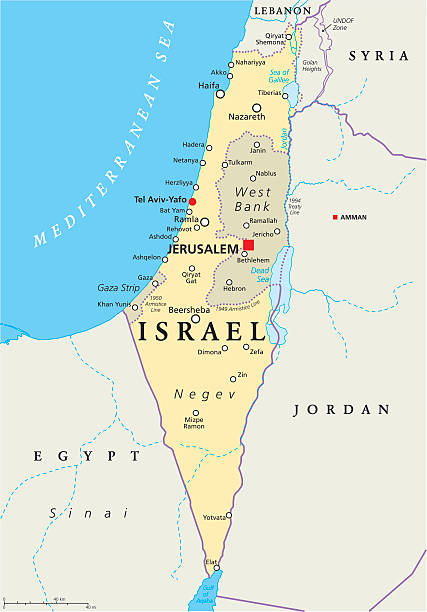We Can and Should Criticize Israel
A map of Israel and Palestine.
May 24, 2023
Outside of Deerfield, my identity would be pretty rare—I’m a Jew that’s critical of Israel. Deerfield has a funny way of warping your perspective. Living in a community that has grown exceptionally friendly and tolerant of Jews lets you begin to forget about the antisemitism that bubbles around the majority of the United States landmass. And living in a community that is exceptionally liberal and progressive (albeit not-so-united on the Israeli-Palestinian conflict) has you begin to forget about the terrible, terrible taboo it is to impeach the morality of Israel’s actions toward Palestine around a conservative (politically, although more religious Jews also tend to be more conservative) Jew. When, last November, I began reckoning more seriously with my thoughts on Israel, these facts surfaced before me, angry.
First, the cultural winds have been blowing in a direction that says, “It’s not the time.” It’s not the time to dredge up this debate, what with Kanye West appearing on podcasts around the country, spewing antisemitic garbage, riling up fans who secretly agree with him, and then saying that Jonah Hill made him like Jewish people again. It’s not the time because, right now, a lot of people who would join the conversation on Israel will be doing so for the wrong reasons. It’s not the time because we have to tackle antisemitism here before we start being critical over there.
I wouldn’t deign to suggest that any of that is false. It is a bull market for antisemitism. It’s only—if that’s a valid reason to keep my mouth shut, when could I ever open it? Is there going to be a day in my lifetime when the Anti-Defamation League will wipe its hands and say, “Congratulations, everyone! Mission accomplished?” I doubt it. Perhaps, too, I am being overdramatic about the “cultural winds.” The ADL summarizes its position on anti-Israel campaigns thus: “ADL speaks out when anti-Israel rhetoric or activism engages in distortions or delegitimizes Israel, crosses into antisemitism when it demonizes or negates Zionism, and uses anti-Jewish assertions and tropes.” This is not an overreach. They’re only asking that people do not lie or be hateful.
Except—and the perspicacious reader might be ready to point this out—the world likes to interpret this rather stretchily. What qualifies as a “distortion” has itself been distorted beyond recognition. And, behind all of that, the ADL’s phrasing is an implicit reclassification of criticism of Israel into “anti-Israel rhetoric.” This attitude alarms me. A core philosophy of movements for justice must be that criticism of a nation is not drawn from hate, but mustered from love. Otherwise, you’re not really out to build a better world. You’re a cartoon villain. It is depressing to see the ADL decide that if you aren’t totally pro-Israel, you are against it.
Criticism of Israel is tricky. It carries a complicated political message. It is worth scrutinizing to look for antisemitism—but it should not be dismissed as antisemitic or anti-Israel altogether. In general, it ought to be seen as the opposite: encouraging a nation to do better because you want them as a partner in the international community. And perhaps, if this is the attitude we adopt as a society, this viewpoint will attract the people who act in good faith and not the antisemites.
However, even when you purify your words—and take every pain to assure the world that your criticism is respectful—the discussion still gets nasty. I don’t mean like a shouting match. I mean that the common Jewish perspective—the one I “ought” to have, the one my extended family is absolutely baffled I don’t—has a frightening tendency to use rather repugnant rhetoric. Should you assert that Israel’s military occupation, illegal settlements, and the like constitute a cultural genocide, as The Center for Constitutional Rights did, you may hear a denial or some semantics about whether it was really genocide qua genocide—neither of which, I promise, will look pretty in hindsight. But that’s not what’s truly awful. I spoke to a family member about whether what Israel is doing is ethnic cleansing. She responded with the rhetorical question, “Okay, you be the prime minister. What would you do?”—as if there’s no better answer, and so we might just accept it. If you speak to certain classmates of mine, they start explaining that “Palestinians elected Hamas” and “their stated goal is the destruction of Israel”—as if that makes it all okay.
I understand, and I think it’s important that we all understand, why my family and the Jewish community would get defensive about this. The fear of another holocaust is incredibly salient in any Jew’s mind—and this is because antisemitism, as I was saying, is incredibly salient in our society. And, to many Jews (and to the Zionist movement), the existence of Israel is necessary for the protection of our people against genocide. They are not wrong. In every other place that Jews have lived, we’ve faced awful persecution. To their credit, the ADL does a pretty good job summarizing the story in their “Brief History” (though, I will point out that the final section complains again of the “excessive criticism of Israel”). It’s only natural that some Jews are willing to defend this one safe harbor against all attacks—even permitting its government to do some horrific things against another people. Or, “natural” is the wrong word; it’s sad, but expected.
The bottom line, however, is that we cannot let that stop us from talking about how fifteen Palestinian children have been killed so far in 2023. We cannot end the conversation on the potential anti-democratic overhaul of Israel’s judicial system, which has ignited the largest street protests in the nation’s history. We Jews cannot let our need for a country of our own, our need for a haven, get in the way of our duty to criticize Israel—because if that happens, then Israel, the one country that is supposed to be safe for us, will deteriorate into tyranny, into just another abusive homeland.


